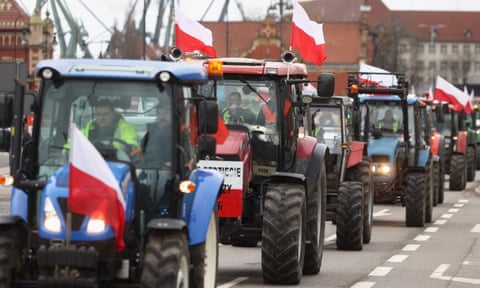Protesting Polish farmers have left the Agriculture Ministry building they have occupied since Tuesday, frustrated by a government that has not responded adequately to their demands, including halting the transit of Ukrainian grain and sugar through Poland, Euractiv reports.
After spending the night at the ministry building, the farmers demanded a meeting with Prime Minister Donald Tusk, arguing that the promises the government has made so far are unsatisfactory. By Wednesday, most of them had left the building without speaking to Tusk. Wiesław Gryn of the Zamość Agricultural Society said:
The Ukrainian transit was supposed to be halted, but the grain still passes through Poland. There were supposed to be changes in the Green Deal, and there are no changes.
Since the beginning of the year, Polish farmers have been protesting against the European Green Deal programme and the massive influx of Ukrainian agricultural products, which led to a drop in demand and prices for domestic products. Farmers protested in the streets, outside politicians’ homes and on the border with Ukraine.
The protesters negotiated with ministry officials, including Minister Czeslaw Siekierski, until the end of Tuesday, after which they went on strike. Tomasz Obszański of the Rural Solidarity movement, one of the protests’ main organisers, told the movement’s media:
We have not been offered any concrete proposals. We are going on a sit-in strike and staying at the ministry so that we can talk to the Prime Minister (…) and establish (together) a certain action plan.
After more than 24 hours, most of the farmers left the ministry on Wednesday afternoon without waiting to speak to Tusk. They claimed that the government had failed to honour its promises to stop imports from Ukraine. Roman Kondrów of the Deceived Village (Oszukana Wieś) movement said on Wednesday, as quoted by the private TVN24 broadcaster:
We were counting on the government to solve the problem, but it is ignoring everything.
Farmers have promised to continue their protests, but in a different form. Protesters will demonstrate outside the offices of MPs instead of blocking roads, AgroFakt reported on Wednesday.
Ukrainian grain and other food products, including poultry, sugar, eggs, frozen raspberries and apple juice, have flooded the Polish market after the Commission suspended trade barriers with Ukraine in mid-2022 to support the Ukrainian economy hit by the outbreak of military conflict in February 2022.
After the Commission refused to extend temporary import restrictions on Ukrainian grain, imposed in response to concerns from Poland and other neighbouring countries, the previous conservative PiS government (ECR) imposed a unilateral import ban, which the current ruling coalition led by Tusk has maintained since coming to power.
As for the Green Deal, contrary to Green’s words, the Commission has submitted a proposal for changes to the CAP component, in particular the GAEC standards. The package presented last month was intended to relax some environmental requirements and give member states more flexibility in policy implementation. The EU Council approved it last week, paving the way for its early adoption.
However, many farmers are calling for the Green Deal to be scrapped, warning that rules that were passed without consulting them will ruin European agriculture. Jacek Zarzecki of the Polish Association of Beef Cattle Breeders and Producers told Euractiv:
The Green Deal is a strictly political project in which the main burden related to the green transition would be placed on the agricultural sector.
The EU Greens have a different view. Dutch MEP Bas Eickhout (Greens/EFA) said when asked by Euractiv about the Polish farmers’ protests:
If the farmers want subsidies, their production must fulfil certain standards, and this is what the Green Deal serves, among other things.
As for grain, Tusk’s cabinet has been discussing with Ukraine a solution to this problem, including during intergovernmental consultations last week.
In late February, Tusk also said that his government would consider banning grain imports from Russia and Belarus on the advice of Ukraine, which claims that Moscow rather than Kyiv is responsible for Poland’s import crisis.
Meanwhile, the prime minister is lobbying at the EU level for sanctions against Russian and Belarusian agriculture and food production.
